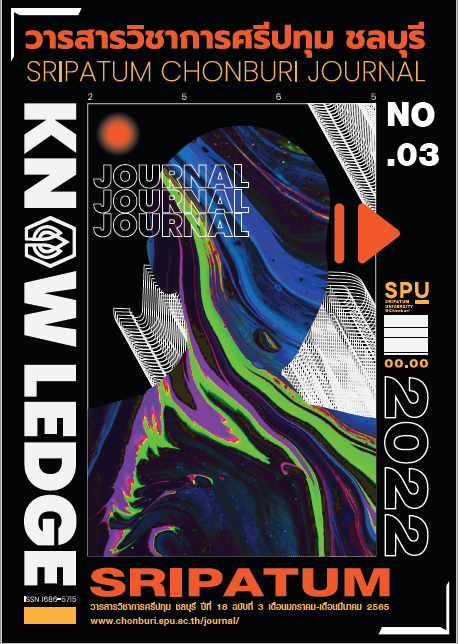MODEL NEW MANAGEMENT AFFECTING TO DEVELOPMENT ORGANIZATIONS IN THAILAND IN NEW NORMAL ERA
Keywords:
new management model, organizations development in Thailand, new normal eraAbstract
This article aimed to study a new management model affecting the development of organizations in Thailand in the New Normal era. This is a study and literature review on variables influencing the model to the development of organizations in Thailand. In the literature review, it was found that there were four main variables as follows: 1) life style, 2) working life style, 3) business model, and 4) investment. In the four elements, the importance of "Digital Technology" was a tool used to change management and was an important factor in organizational development by integrating of digital technology into the core competencies of the organization to develop the business and sustainably have a competitive advantage in the business.
References
ซีพี อี-นิวส์ (CP e-News). (2563). บทเรียนเปิดเมืองจากจีน รู้จัก New consumers กับ 7 เทรนด์เปลี่ยนโลกธุรกิจหลังCovid-19 (ออนไลน์). เข้าถึงได้จาก:
http://www.cp- enews.com/news/details/cpnews/4143 [2563, 12 ตุลาคม].
เดอะสตอรี่ไทยแลนด์ (The Story Thailand). (2563). ชีวิตโลก New Normal และการปรับใช้เทคโนโลยีดิจิทัลอย่างราบรื่น (ออนไลน์). เข้าถึงได้จาก:
https://www.thestorythailand.com/31/05/2020/1704/ [2563, 14 มิถุนายน].
ทีมข่าวคุณภาพชีวิต กรุงเทพธุรกิจ. (2563). จากยุคดิสรับ สู่ยุคโควิค-19 รอดได้ ต้องปรับให้เร็ว (ออนไลน์). เข้าถึงได้จาก:
https://www.bangkokbiznews.com/news/detail/895506 [2563, 23 ตุลาคม].
ธนิต โสรัตน์. (2563). ผลกระทบไวรัสโคโรนา คุกคามเศรษฐกิจถดถอยเลวร้ายสุดในรอบเกือบศตวรรษ (ออนไลน์). เข้าถึงได้จาก:
https://www.posttoday.com/economy/columnist/619876 [2563, 20 พฤษภาคม].
ธรรมนิติ. (2563). ปรับตัวอย่างไรให้ชีวิตและธุรกิจอยู่รอดในยุค New Normal (ออนไลน์). เข้าถึงได้จาก: https://www.dharmniti.co.th/new-normal/
, 18 พฤษภาคม].
พิสิทธิ์ พิพัฒน์โภคากุล. (2556). 7 เคล็ดลับสู่องค์กรบริการที่เป็นเลิศ (ออนไลน์). เข้าถึงได้จาก:
http://oknation.nationtv.tv/blog/pisitpipatphokakul/2013/08/29/entry-1 [2563, 20 พฤษภาคม].
วิษณุ เทศขยัน. (2563). Understanding consumer’s deep behavior เข้าใจพฤติกรรมเชิงลึกของผู้บริโภคหัวใจของการพัฒนาแบรนด์ (ออนไลน์). เข้าถึงได้จาก:
https://positioningmag.com/1301038 [2563, 28 กันยายน].
เศรษฐพงค์ มะลิสุวรรณ. (2559). เทคโนโลยีเปลี่ยนโลก (disruptive technologies) (ออนไลน์). เข้าถึงได้จาก: https://www.it24hrs.com/2016/disruptive-
technologies-technology/[2563, 7 สิงหาคม].
สถาบันส่งเสริมความปลอดภัย อาชีวอนามัย และสภาพแวดล้อมในการทำงาน (องค์การมหาชน). (ม.ป.ป.). New normal (ออนไลน์). เข้าถึงได้จาก:
https://www.tosh.or.th/covid-19/index.php/new-normal [2563, 14 ตุลาคม].
สำนักข่าวอีไฟแนนซ์ไทย. (2563). SCB CIO เผย 3 บทเรียนจาก วิกฤตCOVID-19 (ออนไลน์). เข้าถึง
ได้จาก: https://www.efinancethai.com/LastestNews/LatestNewsMain.aspx? ref=A&id=MTl3R2NWTjllYUU9 [2563, 7 สิงหาคม].
เสาวณี จันทะพงษ์ และทศพล ต้องหุ้ย. (ม.ป.ป.). ผลกระทบวิกฤต COVID-19 กับเศรษฐกิจโลก: This time is different (ออนไลน์). เข้าถึงได้จาก:
https://www.bot.or.th/Thai/ResearchAndPublications/articles/Pages/Article_18Mar2020.aspx [2563, 20 มิถุนายน].
หลักทรัพย์บัวหลวง. (2563). ลงทุนอย่างไรในยุคโควิด 19 (ออนไลน์). เข้าถึงได้จาก: https://knowledge.bualuang.co.th/knowledge-
base/howtoinvestincovid19/ [2563, 10 ตุลาคม].
เอ็กซิมไทยแลนด์ (EXIM Thailand). (2563). 5 ความพร้อมก้าวสู่ผู้ส่งออกมืออาชีพ (ออนไลน์). เข้าถึงได้จาก:
https://exac.exim.go.th/detail/20200323125039/20200723153837 [2563, 25 ตุลาคม].
เอชอาร์ โน้ต (HR Note). (2562). การพัฒนาองค์กร (organization development: OD) ให้ก้าวสู่ความสำเร็จ (ออนไลน์). เข้าถึงได้จาก:
https://th.hrnote.asia/orgdevelopment/190610-organization-development-od/ [2563, 12 ตุลาคม].
แอดมิน เมฆ. (2563). การทำธุรกิจแบบ B2C B2B และ B2B2C ต่างกันยังไง (ออนไลน์). เข้าถึงได้จาก:
https://www.mycloudfulfillment.com/b2c-b2b-b2b2c/ [2563, 14 ตุลาคม].
Amit, Raphael, & Zott, Christoph. (2001). Value creation in e-business. Strategic Management Journal, 22(6–7), pp. 493–520.
Baker, Mary. (2021). 9 future of work trends post-COVID-19 (Online). Available: https://www.gartner.com/smarterwithgartner/9-future-of-
work-trends-post-covid-19 [2020, October 16].
Boland, Brodie, et al. (2020). Reimagining the office and work life after COVID-19 (Online).
office-and-work-life-after-covid-19 [2020, October 8].
Casadesus-Masanell, Ramon, & Ricart, John Enric. (2010). From strategy to business models and to tactics (Online). Available:
http://www.businessmodelcommunity.com/fs/root/8oex1-casadesus_et_ricart.pdf [2020, October 8].
Kotler, Philip, Bowen, John T., & Makens, James C. (2000). Marketing for hospitality and tourism. Hoboken, NJ: Prentice Hall.
Reimer, Bo. (1995). Youth and modern lifestyle. In Johan Fornas and Goran Bolin (Eds.), Youth culture in late modernity (pp. 120-144).
London, UK: Saga.
UNCTAD. (n.d.). The need to protect science, technology and innovation funding, during and after the Covid-19 crisis (Online). Available:
https://unctad.org/webflyer/need-protect-science-technology-and-innovation-funding-during-and-after-covid-19-crisis [2020, June 12].
Downloads
Published
Issue
Section
License

This work is licensed under a Creative Commons Attribution-NonCommercial-NoDerivatives 4.0 International License.
บทความทุกบทความเป็นลิขสิทธิ์ของวารสารวิชาการศรีปทุม ชลบุรี



